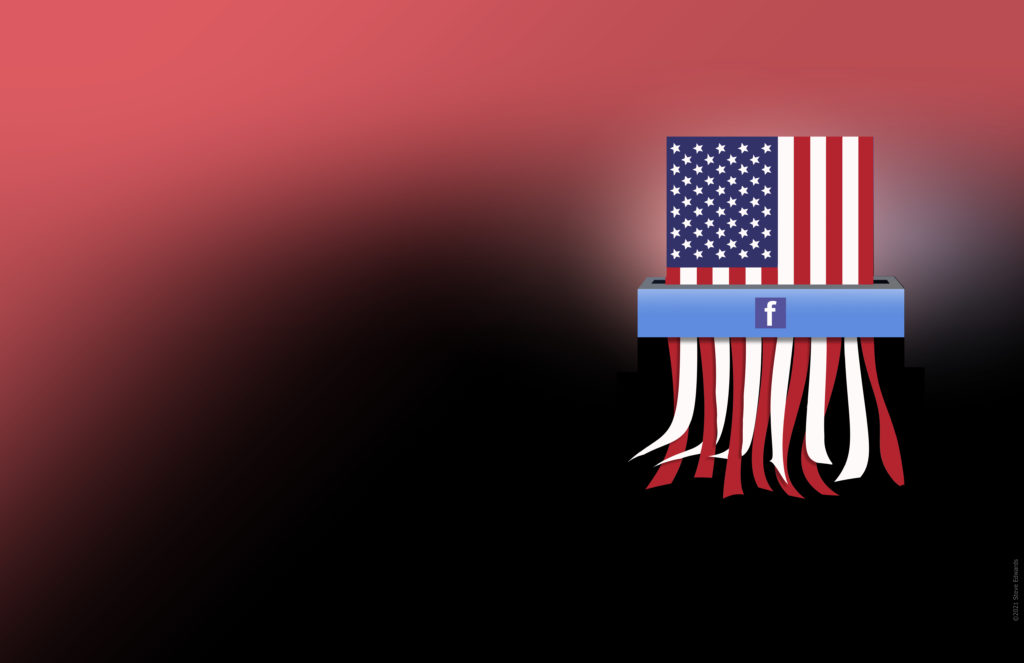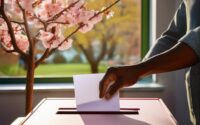Publisher’s Note: The First Amendment’s nervous breakdown at 230
230 years after its ratification, the First Amendment is having a nervous breakdown.
Billions of bits of information and misinformation flood the public sphere every day leading people to throw up their hands because they can’t figure out what or whom to believe.
Bedrock principles of Enlightenment philosophers and great First Amendment champions, Justices Oliver Wendell Holmes and Louis Brandeis, are no longer certainties. We’re not sure anymore that truth will emerge from the marketplace of free expression or that a democracy can depend on free speech to disinfect public debate and find the path forward.

The consequences of information chaos are frightening. Thousands, maybe 10s of thousands of Americans are tricked by misinformation about vaccines and end up getting seriously ill and dying. A large part of the electorate believes former President Donald Trump’s lies about the 2020 election and seems energized by the false claim to take back power. Many Americans are not outraged by Jan. 6 – the riot, insurrection, coup – when Trump tried to block the peaceful transition of power that is fundamental to democracy and never before has been challenged as he challenged it.
A year ago GJR called the election a “stress test” for American democracy and said, “The transfer of power has happened so many times we take it for granted, Yet with this self-absorbed man in the White House nothing can be taken for granted.” It seems Vice President Mike Pence needed the advice of former Vice President Dan Quayle to stand up to Trump. Even the chairman of the Joint Chiefs of Staff feared a coup.
As part of its annual First Amendment celebration, GJR called on some of the best First Amendment thinkers in St. Louis to write about the health of the First Amendment and 1A controversies bubbling around us – from the fields of Washington University, to the school boards of Webster Groves and Kirkwood, to the Missouri Legislature to the governor’s mansion in Jefferson City,
GJR also interviewed Claire McCaskill, former Missouri senator turned MSNBC/NBC commentator. Jo Mannies, retired dean of political reporters in Missouri, asked her about the presss, media literacy and the First Amendment during an hour-long zoom event.
One contributor to this special First Amendment issue is Mark Sableman, one of St. Louis’ leading media lawyers and a partner at Thompson Coburn. Printers’ ink flows in his veins. His hobby is his print shop in his basement. Sableman, who has spent a lifetime defending the media, writes in this issue that it’s time to rethink protection of anonymous speech, rethink the extraordinary legal protection that allows Facebook to send users to ideological extremes and reconsider Enlightenment assumptions.
As he put it, “legal thinkers need to move on from simplistic Enlightenment assumptions about human rationality. We know from modern neuroscience and physiological research that humans are far more irrational and susceptible to manipulation than our Enlightenment forbearers realized, and that psychologically targeted and high-emotion content often leads people astray.”
Those wonderful little computer phones people stare into for hours every day are providing that targeted, emotional content pushing people to political extremes.
McCaskill told Jo Mannies that all public school students should be required to take media literacy in the 7th grade. She pointed out that candidates for office are no longer expected to tell the truth or to have any experience in government. Former President Donald Trump broke those molds.
McCaskill wondered if an inexperienced businessman in Virginia could win the governorship by courting Trump voters but not embracing Trump himself. We know now that the answer was yes. Glenn Youngkin won partly by attacking the bogeyman of “critical race theory” – even though it isn’t being taught in the Virginia schools.
The same thing is happening here. Don Corrigan, the former editor of the Webster-Kirkwood Times, reports in this issue on the good-government sounding group, Missouri Prosper, that brought its roadshow to Webster Groves and Kirkwood opposing the teaching of critical race theory – which isn’t being taught here either.
Meanwhile the Missouri Legislature talks about outlawing CRT and some state legislatures are considering measures to ban use of words such as “equity,” “inclusive,” “multiculturalism,” “patriarchy,” as well as “social justice” and “cultural awareness.”
Mitch Eden, the adviser of the award-winning Kirkwood Call newspaper, knows the antidote to this narrow thinking – uncensored student journalists. Eden asked McCaskill in her zoom interview to support the effort to persuade the Missouri Legislature to pass the Cronkite New Voices bill to overturn Hazelwood v. Kuhlmeier, the 1988 Supreme Court decision allowing principals to censor student journalists in public schools. The decision is one of the most regressive First Amendment decisions of the past half century and 14 states have effectively overturned it. Illinois has, but Missouri has not.
McCaskill told Eden she supported New Voices but was not encouraging. “My candid hat is coming on now,” she said. “Have you been to Jeff City lately? School board meetings have gotten crazy. This whole CRT (critical race theory) thing is out of control. (Attorney General) Merrick Garland writes a letter that just says we want to cooperate if there is a threat of violence….and all of a sudden it turns into the FBI is coming after parents who are protesting. So I’m not sure there is going to be much success in Jeff City.”
Maddie Myers, former editor of the Kirkwood Call and a journalism student at Mizzou, followed up by sending Eden an email explaining how press freedom for student journalists liberates them to seek the facts. “By not having my voice censored,” she wrote, “I have been able to give a voice to the voiceless and shed light on important issues” such as “intruder drills, inequality in sports, and racial equity.”
That is if schools are still allowed to use words like “racial equity.”
Academic freedom is under assault from both the left and right at universities. North Carolina balked at giving Nikole Hannah-Jones tenure even after she won a Pulitzer Prize for her 1619 commentary. And a Yale Law School diversity director, threatened a student who invited fellow students to a party co-sponsored by the Federalist Society. The diversity director told the student the invitation was “triggering” to Black students partly because “FedSoc belongs to political affiliations that are oppressive to certain communities.”
At Washington University this fall, Fadel Alkilani, student vice president for finance, removed flags that College Republicans had planted on Mudd field to commemorate those who died on 911. He said they represented “American imperialism.” Chancellor Andrew Martin condemned the removal of the flags, but then shrank from condemning the wave of Islamophobia directed at Alkilani.
Gregory Magarian – the Thomas and Karole Green professor of law at Washington University and a noted First Amendment expert – called Martin’s failure to condemn Islamophobia “baffling and shameful,” adding that for the university to “embrace the College Republicans’ political view of 9-11 and then to ignore hateful attacks on a student in its charge…cause far greater harm than Alkilani’s errant action to the culture of free speech and open debate on our campus.”
Our cover story looks at the long-dead Fairness Doctrine at a time when no one seems to want to be fair anymore. And in truth, it’s gotten hard for a professional journalist to be fair when a huge segment of the electorate believes fictions. Fairness doesn’t require the media to act as if the vaccine falsehoods or election lies or QAnon conspiracies are reputable ideas.
Susy Schultz, who recently left the Museum of Broadcast Communications, doesn’t kid herself about the Fairness Doctrine being revived. But she believes in media literacy that stresses the value of stories that are reported by professionals. “When you listen or read something, you have to feel confident that you know where the information came from, how the information was obtained and who has what stake in this news getting out there,” she writes.
Meg Tebo, a Chicago lawyer, writes about talk among Supreme Court Justices Clarence Thomas and Neil Gorsuch about tossing out New York Times v. Sullivan. Tebo worries about the “immense harm ill-conceived tinkering” could have.
One harm would be to snuff out the “breathing space” that Justice William J. Brennan Jr. said was so important to public debate – important then during the Civil Rights era when segregationist politicians like L.B. Sullivan wanted to drive the national press out of the South because they broadcast TV images of police attacking young civil rights demonstrators with high-powered fire hoses and police dogs. Breathing room is as important today when 21st century states’ righters would wall off Texas from the reach of constitutional rights.
McCaskill said it was important for citizens to rely on information from sources where there are reporters and where “reporters must run their stories past editors.”
Whistleblowers, professional journalists with editors, minority voices, local news organizations serving as watchdogs of government wrong-doing – all are vital to democracy, the contributors to this edition agree. That is why GJR honored Kay Drey for her half century of whistleblowing, Anna Crosslin for helping make St. Louis a comfortable home for refugees and immigrants, and Donald Suggs for publishing the most outstanding newspaper in the country rooted in the Black community.
When Missouri’s governor starts a criminal investigation of the St. Louis Post-Dispatch because it has performed its watchdog role and disclosed a security breach in state records on teachers, he not only shows he doesn’t understand the role of the press as a watchdog, but also that he doesn’t understand computer coding, Sableman and Post-Dispatch lawyer Joe Martineau told GJR.
And the importance of whistleblowers has been illustrated in recent weeks as whistleblowers at Facebook disclosed that Mark Zuckerberg chose profits over civic duty by pushing users toward the political extremes. A recent story described how a 2018 change in Facebook algorithms in Poland destabilized that country. Social media has been almost as effective as Vladimir Putin in destabilizing democracies, including our own.
Yes, let’s celebrate the First Amendment this year and next and every year after. But we can’t take it for granted or assume it will automatically lead us to truth and the right path for our democracy. We can’t let our democracy’s future rest on Dan Quayle telling Mike Pence the right thing to do in the face of a mob chanting, “Hang Mike Pence.”
All of us as citizens are going to have to work hard to become media literate, to check our sources, to shun prejudices and ideologues and to see through the manipulation of master demagogues who would upend our entire, wonderful experiment in order to grab back the power of the White House.

